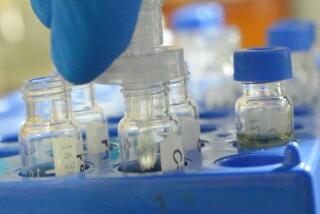Drug Tests : Schools’ Call for ‘Volunteers’ Is Not the Answer to the Problem
Within the next few weeks students in selected San Diego high schools will be asked to participate in a “voluntary” drug-testing program. By giving them permission to participate, their parents will, according to a school district letter, be saying “ ‘I love you’ in a very effective way.”
The message many of those kids will hear will not be “I love you,” but will instead be, “I don’t trust you and I can no longer communicate with you, so we will look to random urinalysis at your local school to help solve our problems.”
Or the message may be even stronger--I have lost control as a parent for a variety of reasons (take your pick):
1. My own life is such a mess (or so busy or so bizarre) I can no longer deal with yours.
2. My own success (or significant other or mid-life crisis) matters more than you do right now.
3. When I/we had kids we didn’t figure it would be such a hassle (or so time consuming or so emotionally draining).
But why stop at voluntary testing, why not insist on mandatory testing for every student, or, better yet, why not install hidden cameras and microphones in our teen-agers’ bedrooms, lockers (for those students still fortunate enough to have lockers) and the cars they drive.
Those steps would certainly cut down on drug use, as well as a lot of other activities our teen-agers are pursuing in their idle hours. But would the price be worth the payoff?
In many ways, the price of the first step, so-called voluntary testing, may be too high and the message we send the wrong one.
First of all, even the lowliest, functionally illiterate high school student knows that there is no such thing as “voluntary” testing. Instead, voluntary drug-testing is remarkably similar to the scenario of a commanding officer glaring at three privates and asking for three volunteers--right now!
Kids who are drug users will either not volunteer, or they will start working on ways to get around the test. A number of well-publicized methods already exist. In fact, next to operating testing laboratories, developing ways of fooling the labs may be our next growth industry. To thwart such trickery, will we resort to having the school nurse hold the cup?
And what about the kids who don’t do drugs? They know that they already say no, so what do they prove by volunteering? If they fail to volunteer--because they find the idea degrading, not worth their time, or purely ridiculous--they make themselves look suspect.
According to proponents of the testing program, being a volunteer will give kids an excuse to say no in the face of peer pressure. When offered an illegal substance at a party, they can always say I’d love to but my number might come up on Monday.
But, as one sophomore told me, “I don’t need that kind of excuse to refuse--I just say ‘no thanks,’ and it’s no big deal.”
And what about the obvious inadequacies of the tests themselves? The most popular tests confuse common, over-the-counter antihistamines with illegal drugs. As drug-testing becomes more popular, labs with no quality control or experience but an eye for a quick buck are opening up all over the country.
And guess whose bucks will pay for the district’s voluntary program--the parents of the volunteers. In fact, for the school district, the price is right for this program, unlike more expensive alternatives such as drug education.
Although just about everyone agrees that education is the best way to fight drug abuse, San Diego city schools have been rather lax in providing it.
Board members recently learned from a staff report that “students in the San Diego city schools are presently receiving an inadequate education for preventing drug usage, even though the resources are available to provide high-quality programming.”
Few teachers are using a district-developed program called “About Drugs,” which would provide five hours of instruction each year to elementary school students. Even more alarming, many students will graduate with only five hours of drug education during their entire secondary school career.
Why not concentrate on improving this dismal record before starting any kind of drug-testing program. The district’s response to that suggestion would undoubtedly be that education is too expensive. But many county school districts are managing to come up with the funds to buy materials and train staff members.
If we choose to educate rather than test our kids, we may have to spend some money, but we will avoid alienating them by considering them guilty until proven innocent. And alienation has to be one of the biggest causes of drug abuse in the first place.
We would also show how much we value them as unique individuals, not specimens in a drug-testing lottery. And if we show we value them, maybe they will learn to value themselves enough not to abuse their bodies and their minds.
More to Read
Sign up for Essential California
The most important California stories and recommendations in your inbox every morning.
You may occasionally receive promotional content from the Los Angeles Times.










